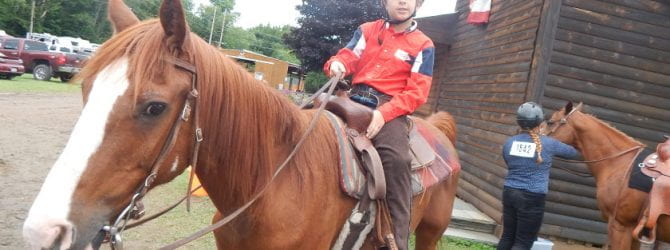The New York State 4-H program recognizes the educational value of participating in animal science projects. This program is designed to make it possible for a 4-H member to have a non-owned 4-H project that can be exhibited at county fairs, New York State Fair 4-H show, and other youth or open exhibitions.
General Project Requirements for Leased Animals
Lease Arrangement
The lease arrangement is between 4-H member/family and the animal owner. The 4-H family and animal owner may choose to enter a format (written lease) agreement or a less formal (verbal) agreement. New York State 4-H recommends a lease agreement. A sample written lease is provided for 4-H families to use, if desired.
Choosing An Animal
Market animals are not eligible for the lease program because they are a terminal project. The following animals may be leased.
- Breeding Animals: Dairy Cattle, Dairy Goats, Meat Goats, Beef Cattle, Sheep, and Swine
- Prospect Beef Calves (Heifers and Steers)
- Llamas
- Horses
Housing
The animal(s) may be housed at the owner’s facility OR the 4-H member’s facility; however, the 4-H member must have significant access to the project animal(s) and must assume a role for the care, training and feeding of the animal(s).
Project Learning
The 4-H member must participate in the learning about the care, training, feeding and other management practices associated with the species of animal(s) they are leasing.
Liability
Neither the animal owner nor their family members/employees are considered New York State 4-H Volunteers in their role of leasing animals.
Exhibiting/Showing Leased Animals
Breeding Animals and Prospect Beef Calves
Who May Lease An Animal
Animals may only be leased by one person (or, in the case of a “family lease,” 4-H members in an immediate family) during the time of the lease.
Showing of the Animal
Once a lease agreement is in place, refrain from allowing any other individual – including the owner – to enter/exhibit the animal in any show/exhibition during the time this contract is in effect. If the lease is a “family lease” only the 4-H members in that immediate family are eligible to show the animal(s) for the duration of the lease.
Horse
A horse may be leased by more than one 4-H member, but the shared horse may be used only once in any event per show. Age, grade or type divisions are considered class divisions and not separate events.
- If a member shows in Western Pleasure, another member may not use the same horse for Western Pleasure. The second member may use the horse in other events, such as Western Horsemanship or English Pleasure.
- If a member shows a horse in Gymkhana, another member may not also use the same horse for a Gymkhana class. The second member may use the horse for other events.
- If a member shows in English Pleasure another member that is too young to qualify for the New York State 4-H Horse Show may also show in English Pleasure.
Animal Care & Expense
Delaware County 4-H recommends discussing the following questions with the owner of the animal(s) before making a decision about the lease program.
Housing
Where will the animal(s) be housed?
Feeding
Who will be responsible for purchasing feed and feeding the animal(s)?
Management
What are appropriate training techniques? What type of feed or housing facility is acceptable, etc.? How often do you expect to exercise, run, walk, tie and wash/rinse the animal(s)? How often do you expect to meet to work together on project care and learning (i.e. clipping, showmanship, training, animal husbandry experiences such as help vaccinate or tag/tattoo)? What other expectations do you have of each other?
Veterinary Expenses
Who will pay for the following: basic expenses for health and well-being of the animal(s) such as worming, vaccinations, etc.? Show related veterinary expenses that must be done for showing or transporting animals? Additional vaccinations for moving animals in or out of state, health certificates, etc.?
Hoof Trimming/Farrier Expenses
Who will pay for this? It might depend on whether extra expenses are incurred as a result of showing an animal(s).
Clipping
If the animal(s) needs to be clipped/fitted prior to a show and someone to help you as you are learning, who pays for this service?
Shearing
Who will pay the shearer? Who keeps the fleece?
Breeding Fees
If the animal(s) is to be bred as part of the 4-H member’s project (or needs to be bred during the term of the lease), who will pay for the breeding fees? Who makes the decision as to which sire the animal(s) will be bred to? Who keeps the offspring?
Show Expenses
What show equipment (i.e. saddles, halters, blankets, cages, etc.) may be borrowed or used during the length of the lease? What if an item gets lost stolen or broken? What supplies are you responsible for purchasing in order to show the animal(s) (i.e. clipper blades, sprays, foams, soap fly sprays, show halters, leads, brushes/combs, feed pans/pails, show stick, etc.)?
Insurance
If a fair/show require entrants to show a certificate of liability insurance to protect themselves form damage or injury the animal(s) might cause while at the event, parties should check with their personal or farm insurance agent to ensure appropriate coverage.
Trucking
Who will transport the animal(s) to and from trainings, shows and/or fairs? Will you be required to pay for fuel or to help with trucking expenses?
Entry Fees, Premiums and Awards
Who pays for entry fees to open shows entered? Who receives premiums and cash awards earned? Who keeps the awards, ribbons, plaques, trophies or winning banners?
Unanticipated Injury or Death of Animal
Who will be responsible for emergency veterinary care? Who is liable for the loss of an animal(s)?


